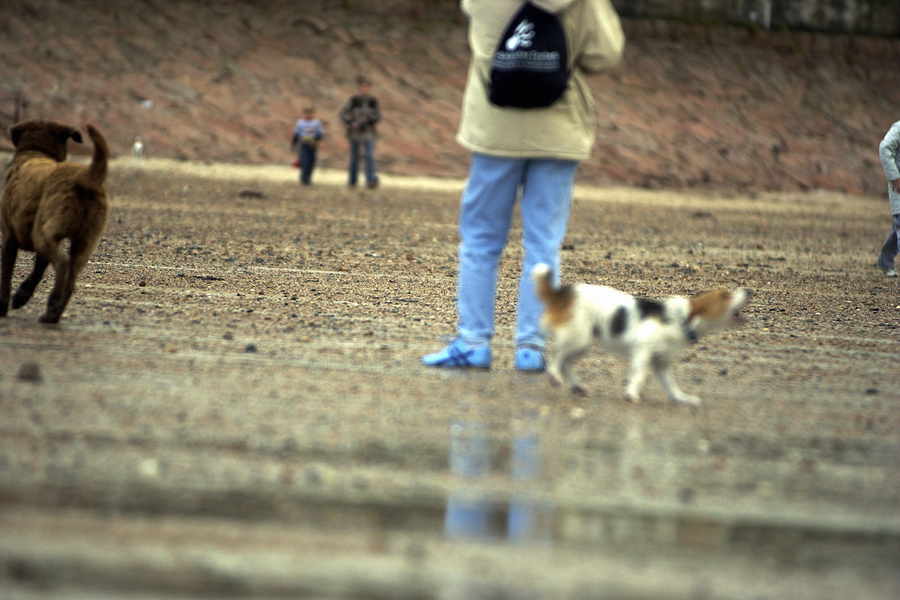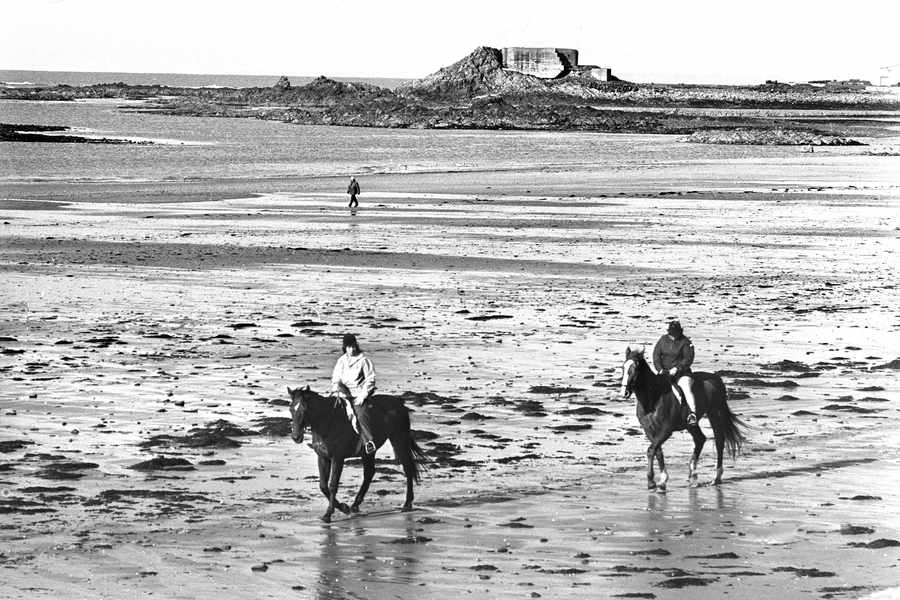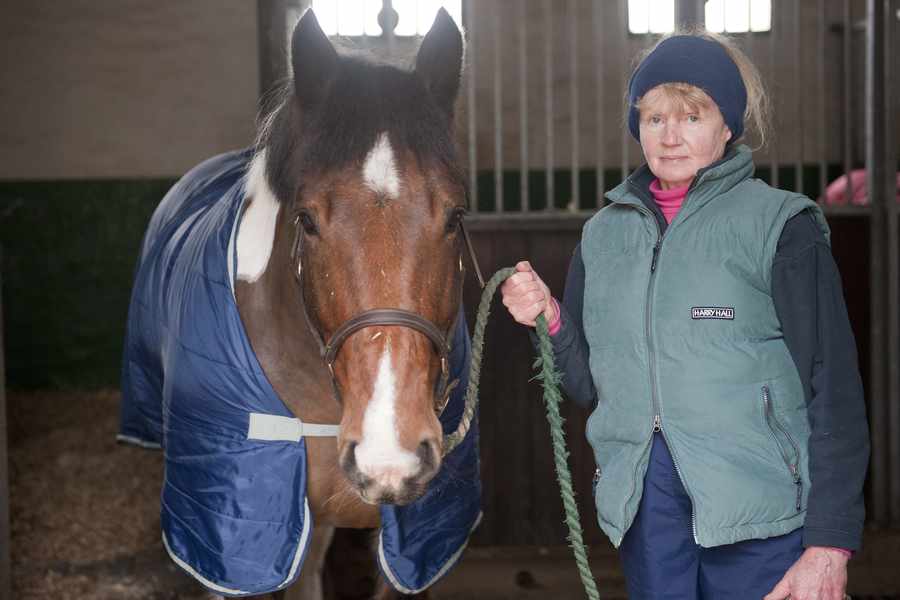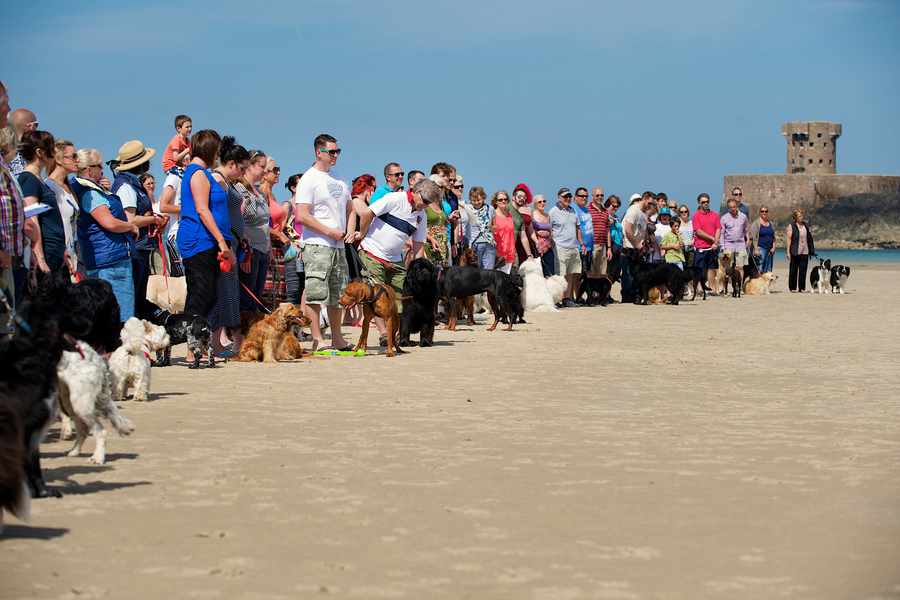In one of the incidents, three dogs chased a horse along the beach, eventually causing the rider to fall.
Both riders were unhurt following their falls, but the incidents have prompted horse rider Julie Settle to call on dog owners to temporarily put their pets on a lead if they see a horse approaching.
Mrs Settle, who says that she has also been chased by dogs while riding but has not been thrown from her horse, was told by friends about the incidents on Friday and is now asking dog owners to take more responsibility for their pets’ actions.
She said: ‘There are lots of responsible owners out there but there are some that do not pay attention and the dog goes running off.

‘There were two bad incidents on Friday and it is something that happens to riders all the time. It is an issue because it can be very dangerous – it is dangerous to the rider and horse, a danger to the roads if the horse bolts and a danger to the dogs.
‘We all love to use the beach and it is great that so many do but I have got a lot of horse riding friends who don’t want to go to the beach because of the dogs. I think people with dogs could be a bit more aware of what is going on.’
Mrs Settle, who has owned horses for a number of years, has said that if owners are unsure of how their dog will react then they should temporarily put it on a lead.
She added: ‘I know my dog would want to run by a horse if it sees one so I put her on a lead. A lot of people don’t realise that when a dog sees a horse they may chase and want to play.
‘The problem is that as soon as the dog has gone it is very difficult to get it back and if the horse reacts badly then it could be very dangerous and cause accidents. We all need to take responsibility for our animals.’


A RIDER told last year how she clung on for her life after her horse was savagely attacked by a Rottweiler as she rode along a country lane.
Angela Mitchell was riding down Mont ès Neaux in St Saviour on her horse, Star,in January, when the dog broke free from its owner and pounced on the animal.
Mrs Mitchell, who has been riding for nearly 50 years, described how she was left clinging to the reins as the dog launched itself at her frightened horse. ‘It was the most terrifying experience I’ve had,’ she said.
‘I’ve never known anything like it. Dogs sometimes chase Star but they usually back down. This dog wasn’t backing off.’
Mrs Mitchell was uninjured in the incident, but Star suffered numerous puncture wounds to his muzzle and leg.
Describing the attack, Mrs Mitchell said: ‘The owner bent down to tie her shoelaces and the dog ripped the lead from her hand and charged towards us.
‘It had a very big jump and went for Star’s neck and face. The horse reared up and nearly threw me off.’ Star then bolted across a field, leaving Mrs Mitchell to cling on to the reins.
She said: ‘I thought I must stay on the horse. If I’d fallen off, then I might have been attacked or the horse could have run into the roads and caused a car accident. I was hanging on for dear life. ‘The owner of the dog apologised, but it was a terrible attack.’
The Rottweiler had recently been brought to the Island after being rescued by the RSPCA in England.
It is understood that it was the first time that the owner had taken the dog out on the roads. Mrs Mitchell added: ‘That dog shouldn’t have been taken to a public place. It’s dangerous.’

In December, Jersey’s new Economic Development Minister said he would look at a review of the law relating to dogs on beaches, but that it was not currently top of his priorities.
Senator Lyndon Farnham took over as minister on October 2014 and was intending to read a report prepared at the request of his predecessor, Senator Alan Maclean, relating to the possible options for changing the law relating to when dogs can be on Jersey’s beaches without a lead.

The review followed a protest at Le Braye, in St Ouen’s Bay, in June when 100 dog owners turned up to call for the current restrictions, which mean that their pets must be on leads on beaches between 10.30 am and 6 pm from May to September, to be relaxed.
It also came after 1,500 people voted in a JEP poll on the subject, with 48 per cent of those who responded saying that the current restrictions were fair, 26 per cent that they were too harsh and dogs should be able to run free all the time and eight per cent saying that they should be kept on leads at all times.
Senator Farnham said: ‘A report was done for the previous minister, which I haven’t read yet – it is on my list of reports to read,’ he said.






